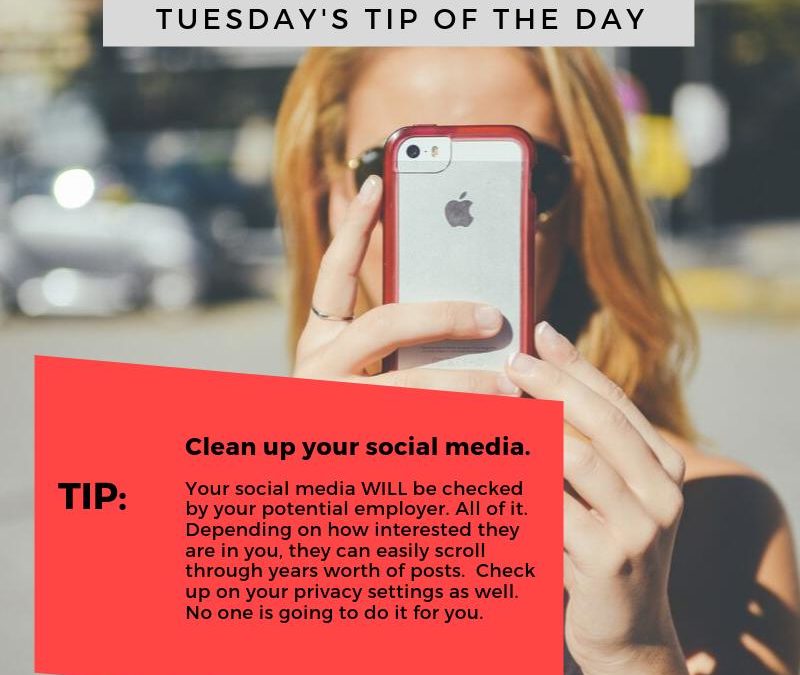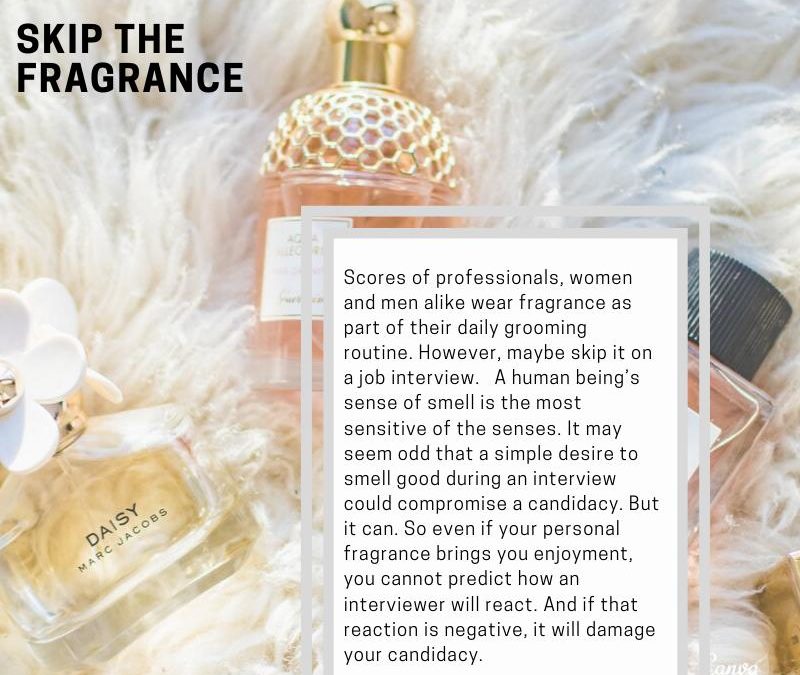


Tuesday Tip: Clean Up Your Social Media

Tuesday Tip: Skip the Fragrance!

Why Work Relationships Affect Our Mental And Physical Health
If you feel closely connected to your work cronies, you’re likely the healthier for it—and this applies to both physical and mental health. A meta-analysis in the journal Personality and Social Psychology Review reports that people who feel more camaraderie with their colleagues, and more connection to the company itself, have better health and happiness and are less likely to burn out. Given all the past work on how important our social relationships are for all aspects of health, the results aren’t too surprising, but it’s nice to have this kind of confirmation from such a large study.
The new analysis looked at 58 past studies that included 19,000 people in 15 countries. The participants worked in all different fields–health, sales, the military. The participants had answered questions about their work life, and their feelings about their colleagues and companies, and various aspects of their mental and physical health.
People who identified more strongly with their colleagues at work and with their organizations had greater psychological well-being, and also better physical health.
“We are less burnt out and have greater well-being when our team and our organization provide us with a sense of belonging and community—when it gives us a sense of ‘we-ness,’” said study author Niklas Steffens in a news release.
And this “we-ness” is important. This comes from social identity theory, which, as the authors write, “starts from the assertion that people are able to think, feel and act not just as individuals (i.e., in terms of a personal identity as ‘I’) but also as group members (in terms of a social identity as ‘we’).” The theory also suggests that when we see ourselves as part of a group, we’re more likely to see the world from the perspective/s of our fellow group members, and more open to be influenced by them, and to trust and to work together with them.
Feeling this we-ness, or being part of an in-group, is linked to health and well-being in a bunch of ways. The authors suggest that it increases a person’s sense of belonging, meaning and purpose, and one’s feeling of control and agency, among other things. These factors intuitively go hand-in-hand with health, but they’ve all been linked to health in previous studies.
Originally posted by Alice G. Walton on Forbes.com

What CEOs Look For: 5 Things To Ace The Interview
Gary Burnison is CEO of Korn Ferry and author of Lose the Resume, Land the Job.
Where you’re going is far more interesting to your next boss than where you’ve been.
Too many job candidates, though, focus on the rearview mirror, describing every detail of everything they ever did. As a CEO who has interviewed countless people, I can tell you that your next boss (whether in your current employer or a new organization) is most interested in your contribution to the journey ahead.
Here are the 5 things you must do to ace your next job interview.
Accomplishments, Not Activities: No one wants to know your job description. The hiring manager you’re meeting with (who probably scanned your resume for less than a minute) doesn’t want to hear about your day-to-day activities. Accomplishments, though, speak volumes not only about what you’ve done, but most important about what you bring to your new job. Prepare and rehearse specific examples and tell a brief story that shows how you’ve made a difference to your company and the customers it serves.
What Gets You Up in the Morning? Of all the qualities I’m looking for, motivation tops the list. I want to know what gets people excited about their work—their passion and hunger to make a difference. I can also tell you that most leaders aren’t looking for the smartest people. (A study found that those with the highest IQs aren’t necessarily the best hires, especially for a leadership position.) Rather, they are looking for savviness, culture fit, and authenticity. So ask yourself: what gets you up in the morning? Be able to showcase your motivation by talking about what you’re passionate about.
Connectivity-Master the Small Talk: When I interview someone, I always meet the candidate in the lobby or reception area, then take the person into the office kitchen. It’s not about getting coffee or water. I want to start in a familiar environment to help people relax so they can be themselves. (In an interview, authenticity rules!) We might stay there for ten minutes making conversation, but never about work. We’re getting to know each other, establishing rapport and connectivity. Whether your next interview includes a “kitchen chat” or you spend a minute or two with a “getting to know you question,” you need to be a master of small talk. Be comfortable giving short responses (30 seconds, maximum) about where you’re from or your family (which can mean anything from family of origin to your children). And, don’t be afraid to ask the same questions of the interviewer (although never “go personal” until the interviewer does). This give-and-take shows your comfort and confidence and sets the tone for a successful conversational interview. An interview, after all, is not a pop quiz—it’s a conversation between two people.
Know the Company and the Position: One of my favorite questions to ask early in the interview is, “So, tell me what you know about our company and the position you’re seeking?” It’s astounding how many people can’t give a straight answer to this one. You’ve got to prepare—read the company’s website, press announcements, earnings announcements (if the company is publicly traded), and analyst reports on the company or industry. Look up the LinkedIn profile of the person you’re meeting. You might find an interesting connection, e.g. having the same alma mater, a shared passion for sports or a social cause, or other common ground. (But don’t fake it—you can’t “pretend” that you belonged to the same fraternity/sorority and know the “secret handshake.”) Bottom line—do your homework!
Culture Fit: The more senior the position being filled, the more the interviewer will emphasize culture fit. Technical skills at a senior level are assumed—it’s all about fitting in and being able to lead and motivate others. Culture fit matters at more junior levels as well. Studies show that nearly half (46 percent) of new hires fail within the first 18 months, largely because of cultural incompatibility. Understand what suits you best, from your ideal work environment to the type of boss you want to work for and learn from. The more you know about yourself, the better you can demonstrate fit to your prospective employer.
No, you can’t drive the interview. But with these five must-do tips you’ll be able to help steer the conversation to showcase your savviness, your hunger and drive, how well you fit with the culture, and your authenticity. You’ll navigate forward to what you bring to this new job, instead of staring in the rearview mirror.
A version of this article appears on Forbes.com
This article was originally posted by Gary Burnison on KornFerry.com

What do recruiters look for on your Linkedin profile?
Originally posted by Gwen Moran on FastCompany.com
When you’re looking for a job, your LinkedIn profile is a 24/7 information resource for the recruiters who are looking for talent. In fact, in the Jobvite 2016 Recruiter Nation Report, 87% of recruiters find LinkedIn most effective when vetting candidates during the hiring process.
But what really catches a recruiter’s eye when they’re scrolling through your profile? Here, several weighed in about profiles that make them reach out—or recoil.
INCOMPLETE PROFILES ARE A TURN-OFF
When Cassandre Joseph, senior talent acquisition visionary and strategist at recruitment firm Korn Ferry, looks at a profile, she wants to see your work experience, education, and accomplishments. Incomplete profiles make it more difficult to determine whether you’re the best match for the job, because she can’t get the whole picture. It’s a bad first impression, she says.
“I find somebody’s profile and it says they’ve worked at, according to the profile, four different places simultaneously. They’re adding the new places, but not putting end dates. That says they haven’t updated their LinkedIn profile in X amount of years,” she says.
DON’T USE SELFIES
Your profile photo makes the first impression, so put a little effort into it, says resume expert and retained search consultant Donna Svei. It should look professional and representative of the job you are seeking. Selfies and vacation photos tell recruiters you couldn’t be bothered to make yourself look more professional.
“People can easily evaluate their profile photos using Photofeeler.com and Snappr.com,” says Svei.
WHO YOU “KNOW” MATTERS
Profiles with just a few contacts are also unappealing, says Molly O’Malley, a tenured recruiter at Adams Keegan, a national HR management and employer services provider. The most effective people have robust networks, and your LinkedIn profile should represent that. You don’t need thousands, but 300 or more is ideal, she says So, beef up your contacts before you look for a new job.
DISCREPANCIES ARE RED FLAGS
Joseph says recruiters often look at profiles to confirm information about a candidate. So when your dates of employment, job titles, or other facts are different on your profile than they are on your resume, a recruiter might worry about how detail-oriented you are—or if there’s reason to believe that you’re not being truthful on one or the other.
NO ONE HAS TIME FOR A LONG, DENSE SUMMARY
Think of your summary like a copywriter would, Svei says. Highlight what’s in it for recruiters to contact you, such as your achievements, honors, and success stories. Use short copy blocks and bullet points so they can read your summary easily. As more recruiters use mobile devices, your copy should be easy to read on small screens. Svei says it’s also critical to include keywords about your industry for easy searchability.
YOUR HEADLINE MATTERS MORE THAN YOU KNOW
Recruiters may also find your LinkedIn profile via Google instead of the platform itself, Svei says. Google search results will typically include your location and the professional headline that appears under your name on your profile. Make the most of that headline by clarifying your industry and job function.
STOP THE JARGON
If your title is something along the lines of “supreme conveyer of IT knowledge” or “social media ninja,” don’t expect a recruiter to try to figure out what you do, O’Malley says. Make your job title and what your company does clear. Jargon or vague language wastes everyone’s time.
RECRUITERS READ YOUR THOUGHTS
During your job search, maintain an active profile, says Melanie Lundberg, assistant vice president of talent management and corporate communications for Combined Insurance. “Read news feeds, share content, comment—it shows a level of professional engagement,” she says. Similarly, link to articles you’ve written or other examples of your work. Many will also be looking for professionalism in what you post.
THOSE RECOMMENDATIONS ARE NICE, BUT . . .
Recruiters are mostly unimpressed with recommendations unless they’re short and really highlight something about your capabilities or strengths, O’Malley says. Don’t ditch them, but don’t put too much stock in them, either.
SAYING YOU’RE JOB HUNTING HELPS
By using the Open Candidates option, you can privately let recruiters know that you’re looking for a job. Svei says it’s a good idea to use this option, which indicates that you want to hear about potential opportunities.
ABOUT THE AUTHOR
Gwen Moran writes about business, money and assorted other topics for leading publications and websites. She was named a Small Business Influencer Awards Top 100 Champion in 2015, 2014, and 2012 and is the co-author of The Complete Idiot’s Guide to Business Plans (Alpha, 2010), and several other books.